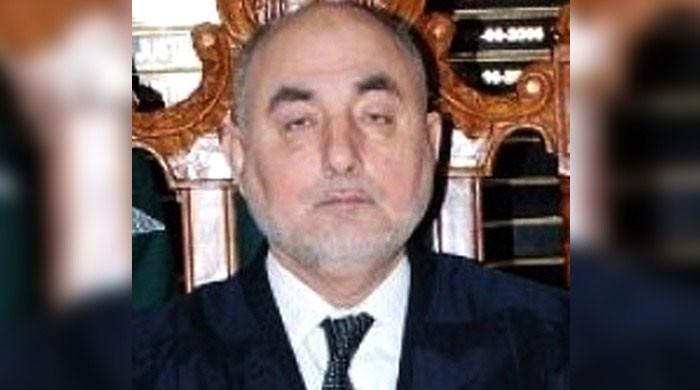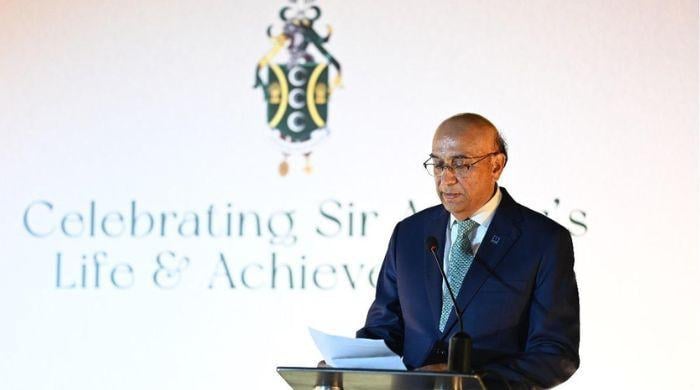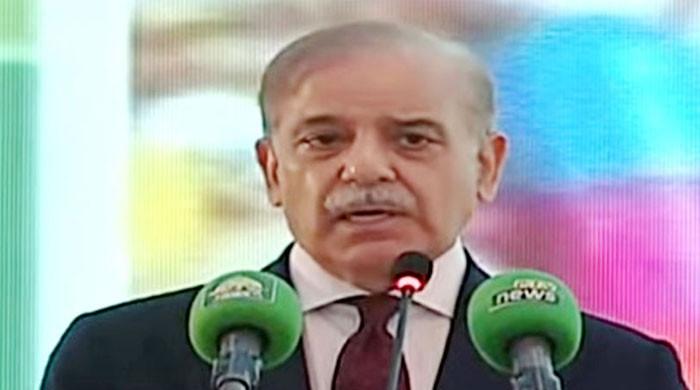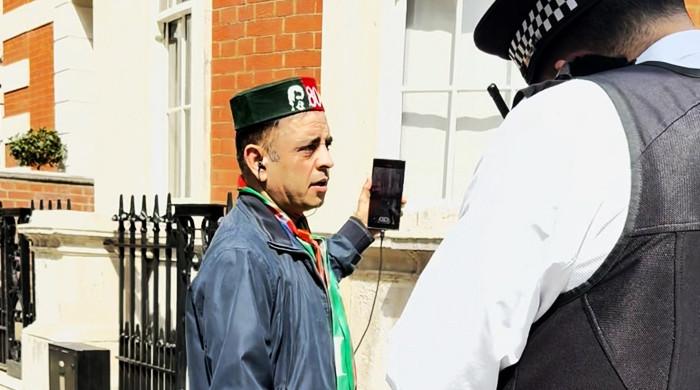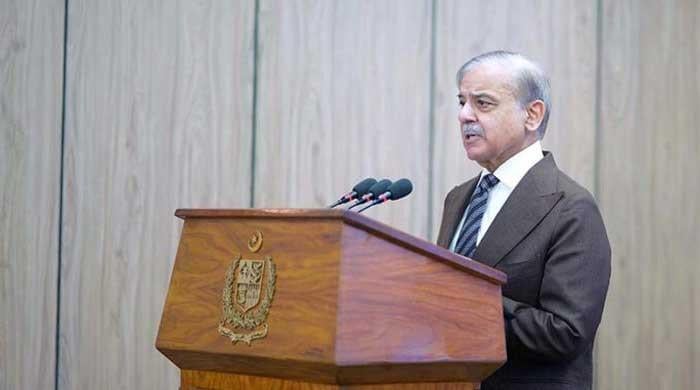Feb 8 polls: CEC Sikandar Raja, CJP Isa discuss LHC verdict repercussions
Meeting comes after LHC suspended ECP's notification regarding appointment of ROs and DROs from bureaucracy
December 15, 2023
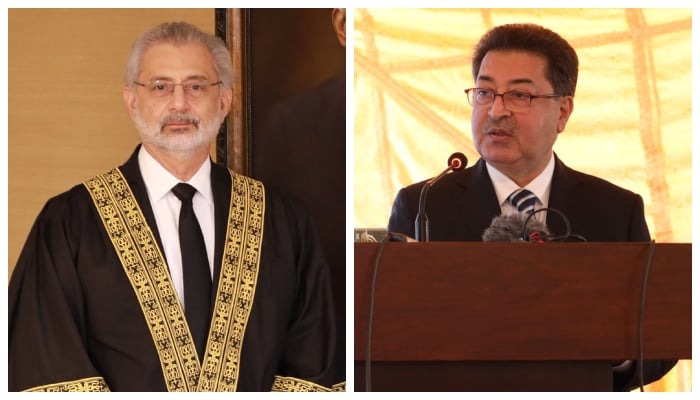
- ECP to move SC against LHC verdict suspending its notification.
- Polls schedule to be announced by Dec 17 for timely elections.
- Uncertainty looms as high-level huddle weighs possible poll delay.
ISLAMABAD: Chief Election Commissioner (CEC) Sikandar Sultan Raja and Chief Justice of Pakistan (CJP) Justice Qazi Faez Isa Friday mulled over the possible repercussions of the Lahore High Court (LHC) verdict, which affected the polling process, sources told Geo News.
During the high-level huddle, also attended by Justice Ijaz Ul Ahsan and Justice Tariq Masood, CEC Raja apprised the apex court judges regarding the LHC's December 14 decision, suspending the electoral body's notification requesting returning officers (ROs) and district returning officers (DROs) from the bureaucracy for the general elections slated for February 8, 2024.
LHC's Justice Ali Baqir Najafi had Wednesday night ruled on Pakistan Tehreek-e-Insaf's (PTI) plea, which contended that the electoral body's move to appoint DROs and ROs from bureaucracy would hinder the prospects of impartial and transparent elections.
Accepting the PTI's plea, Justice Najafi suspended the ECP's notification and referred the matter to referred the case to the LHC chief justice, recommending constituting a larger bench to hear the case.
Sources have told Geo News that it is expected that the top court might take notice of the issue to ensure the implementation of its earlier decision regarding holding timely elections.
The sources said that it is possible that the apex court might not interfere in administrative affairs but simply empower the ECP to appoint ROs and DROs.
The court, to ensure the implementation of the 54-day period —minimum threshold from the announcement of elections scheduled to the holding of polls — might take a decision either today or tomorrow in this regard as the ECP needs to announce the poll schedule by December 17 for holding of Elections on February 8, the sources added.
It is to be noted that a larger bench of the LHC will take up the issue of the appointment of ROs and DROs on December 18 (Monday).
ECP likely to move SC today
To ensure that polls take place on time, the election commission has decided to file a plea in the SC, with major political parties — Pakistan Peoples Party, Pakistan Muslim League-Nawaz, Istehkam-e-Pakistan Party, Pakistan Muslim League-Quaid, Balochistan Awami Party, Awami National Party — also deciding to become parties in the case pending before the LHC.
Sources have told Geo News that the ECP's application will be filed today under Article 185 of the Constitution.
SC is likely to constitute a bench on the issue as soon as the ECP files its petition against the LHC verdict, sources added.
Meanwhile, the court staff has begun preparations for the expected proceedings in relation to the ECP's petition following the two-hour-long discussions between the SC judges, CEC Raja, the attorney general, and other officials.
Earlier, following the LHC's decision, experts said that the verdict may result in a delay in polls as the ECP — which is already facing a shortage of staff — has stopped the training of ROs and DROs who were appointed for the upcoming general elections.
Responding to such concerns, the country’s top electoral body had earlier rebuffed the possibility of any delay in the upcoming polls.
In its statement, the ECP said that it would soon announce a plan of action and added that it "cannot be blamed in any manner for the current situation.
The meeting comes as, in line with the Supreme Court's orders, the CEC and President Arif Alvi had agreed holding the elections on February 8 — back on November 2.
The top court's three-member bench led by CJP Isa had ruled that the date has been "set in stone", stressing that no institution should delay the elections any further.
ECP’s prerogative
With all the uncertainties surrounding the polls, caretaker Federal Minister for Information and Broadcasting Murtaza Solangi said the election commission would announce its “action plan” in the light of the Constitution and law.
Talking to the media outside the ECP, he said under Article 218(3) of the Constitution, the only constitutional body responsible for conducting elections in the country was the election commission.
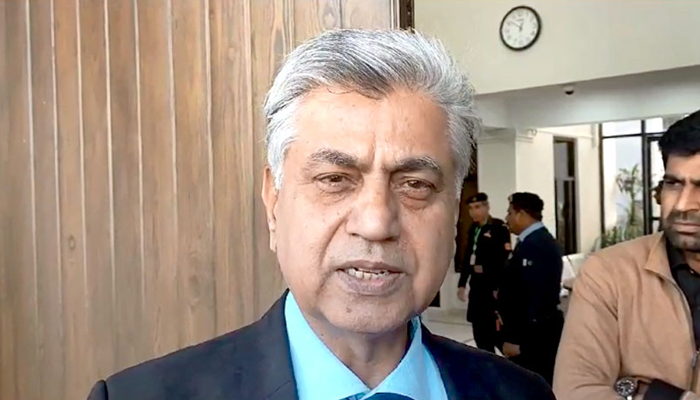
“We neither can question the election commission, nor we can supervise it, in fact, the election commission supervises the caretaker government,” Solangi maintained.
He said if anyone had a complaint with the ECP, he could contact the commission. The ECP, under the Constitution, enjoyed the power to appoint DROs, Solangi remarked.
Election conundrum
Upon the advice of then-prime minister Shehbaz Sharif, President Alvi dissolved the 15th National Assembly three days before the completion of its 5-year term.
The former government prematurely dissolved the lower house to ensure that the polls were scheduled 90 days later — in line with the Constitution.
However, that did not seem to happen, as the commission had said that it could not follow up on the 90-day deadline as it had to work on fresh delimitation of constituencies after the Council of Common Interests (CCI) approved the results of the 2023 digital census
The ECP did that because Section 17(2) of the Elections Act states that “the commission shall delimit constituencies after every census is officially published” — which is in contrast with the constitutional deadline.
In October, the Raja-led ECP announced that the polls would be staged in January next year, but did not announce the exact date, and in return, received flak.
In response to the ECP’s decision to hold the polls later than the constitutional deadline, the PTI and several others filed a plea in the top court seeking timely polls. On the same plea, the SC ordered the ECP and the president to consult, which resulted in a consensus date of February 8.
But that did not seem to shut down the rumour mill and fears of the political parties who repeatedly voiced concerns that since the election schedule hasn’t been announced, the polls would be delayed.
PPP co-chairperson Asif Ali Zardari had also said that a delay of “eight to 10 days” in the general elections would make no difference.





